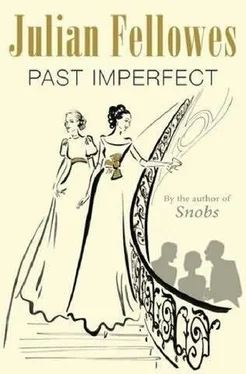The display was done. The girls were blooded, their status as this year’s debutantes confirmed and it was time for the dancing to begin. To counter their former solemnity, the band now played a tune at the top of the hit parade of the day, Simple Simon Says, one of those rather exhausting songs, which is full of uninvited instructions for the listener, ‘Put your hands on your head, shake them all about,’ and so on, but, although almost definitively naff, it was quite a good icebreaker. Lucy was already dancing with one of the other men in the party, so I made the offer to Candida and we walked together on to the floor. ‘Who’s that man you were talking to, before dinner?’ she asked. I did not need to follow her eye-line to know the answer.
‘Damian Baxter,’ I said. ‘He’s up at Cambridge with me.’
‘You must introduce us.’ It was at this moment that I first encountered a particularly terrifying part of Candida’s repertoire. Whenever she spotted someone she thought attractive there would ensue a kind of manic, as she thought flirtatious, ritual rather like a Maori dance of welcome, where she would roll her eyes and snicker and rock back and forth with a kind of shouted laugh more suited to a thirsty bricklayer than a young girl coming out. In fairness, I suppose it must have achieved her immediate ends reasonably often, since there could be no doubt as to what was on offer and we were not spoiled for choice in those days, but I do not think, as a routine, it was ever very conducive to long-term commitment, and in fact earned Candida a reputation, by the end of the Season, of being something of a bicycle. I was never treated to this display head on, as she was not at all interested in me, but even for a witness from the stalls it was pretty unnerving.
Following her hungry glance, I looked back to where Damian was standing at the centre of a small but admiring crowd. Serena Gresham was there, laughing, with Carla Wakefield and a couple of girls I did not recognise. Georgina was hanging back in her usual position of resentful witness to the fun of others. I saw now that Andrew Summersby was one of the party and Mrs Waddilove was busily, but ineffectually, trying to draw him into conversation; or, more to the point, she was trying to involve him in a conversation with her own daughter. But neither would play due, I would imagine, to a complete lack of interest on both sides. A friend of mine from Atlanta always called this kind of social interchange ‘Pumping Mud.’ They were watched from the other side of the table by an older woman, presumably another of Mrs Waddilove’s guests, but I did not recognise her. She was an odd specimen, even in that company. Her face was that of a snobbish, Dutch doll, while the weird combination of her unlikely near-black hair, more Benidorm than good old British, with a pair of piercing pale-blue eyes flecked with shades of green and amber, made her look more than slightly mad, half Lizzie Borden, half stoat. She stood very still as she listened to the conversation limping along, but her stillness held a kind of inner threat of danger, a beast of prey, motionless but waiting to spring. ‘Who’s that standing opposite Mrs Waddilove and Andrew Summersby?’
Candida tore her eyes away from feasting on Damian and glanced across. ‘Lady Belton. Andrew’s mother.’ I nodded. I might have guessed since I could now see that his sister, Annabella Warren, was among the girls in the Waddilove group. I looked back at Madame Mère, as she stood surveying the troops. I had heard of Lady Belton but I had not seen her before that night. One glance was enough to endorse the truth of her reputation.
The Countess of Belton was not generally liked, probably because she was not at all likeable. She was stupid, snobbish to the point of dementia and inexplicably arrogant. Admittedly, she was not vain, nor was she extravagant, but she took this to such a degree that it ceased to be a virtue. In fact, that night she was dressed in what looked like the window display of a Sue Ryder shop in West Hartlepool. Later I would come to know and loathe her, but despite all this, in a funny way I cannot quite explain at this distance, she did have something. Perhaps her absolute refusal to bend to her own times gave her a sort of moral conviction. Certainly she stands out vividly in my memory among the mothers of that year, although I had not then met her beleaguered husband, who always seemed to find an excuse to stay away, and I had only chatted, and not much more, to Lord Summersby, the dull and lumpen eldest son and heir. But even without all this information I saw at once that Georgina’s mother was too obvious and her ambition was not realistic.
Watching her flash her smiles between them all and attempt to ensnare her daughter’s interest, Candida spoke my thoughts. ‘Dream on, Mrs Waddilove.’
She was right. This was a hopeless fantasy. It was quite clear to the most casual observer that Lady Belton’s prejudices would never favour a match with the likes of the Waddiloves, however happy she was to dine and drink through that night at their expense. She wouldn’t have dreamed of it, even if the girl had been pretty. That is unless a sum of money had been involved that was roughly equivalent to the combined African National Debt. As for the boy, I already suspected he was incapable of independent thought, in which I would be proved right. But anyway, the sad truth is that Georgina was not the type to inspire reckless love.
We danced on. Like the well-mannered chap I was then, I partnered my hostess, Lady Dalton, a custom universally observed in those days but almost abandoned now. To me, there was always something faintly comic in the practice, as one steered these middle-aged women around the floor, she wishing it were a foxtrot, you longing for it to end, one’s hand resting lightly on the stiffened stays that were usually detectable beneath the fabric of the evening gown, but, funny as I found it, I am not glad the tradition of dancing with one’s friends’ parents has gone. It made a kind of bridge between the generations in our increasingly fragmented society and I suspect we can use all the bridges that are going. ‘Do you know what you’re planning to do when you leave university?’ she said genially, as we stumbled around in our unsyncopated way.
I shook my head. ‘Not really. Not yet.’
‘There isn’t a preordained pattern to be followed?’
Again I answered in the negative. ‘There’s no estate to come, or family business to swallow me up.’
‘What does your father do?’ At the time, in the late 1960s, this question would have bordered on impertinence, since the smart English had not yet abandoned their pretence that one’s professional activity was of minor, and then only personal, interest. But of course Lady Dalton was engaging in research.
‘He’s a diplomat. But the Foreign Office isn’t looking for my type any more, even if I wanted to follow him.’ Which was more or less true. Had I been an exceptional candidate it might have been different, but for the more regular intake the Foreign Office, always a kingdom of its own in Britain, had decided at some point in the sixties that the day of the gentleman ambassador was over, that henceforth the role must be downgraded socially in order, I imagine, to be taken more seriously by the post-war intelligentsia. Either that, or it was a way of shifting their political loyalties. Forty years later, the results of the policy have been mixed, especially since it has not been adopted by the rest of mainland Europe. The British ambassador these days is generally regarded as rather an oddball in the world’s capitals, both by the international brigade and by the Society of whichever city they find themselves in. One would have thought this might have diminished our backstairs influence. But perhaps that was what they were after.
Читать дальше












